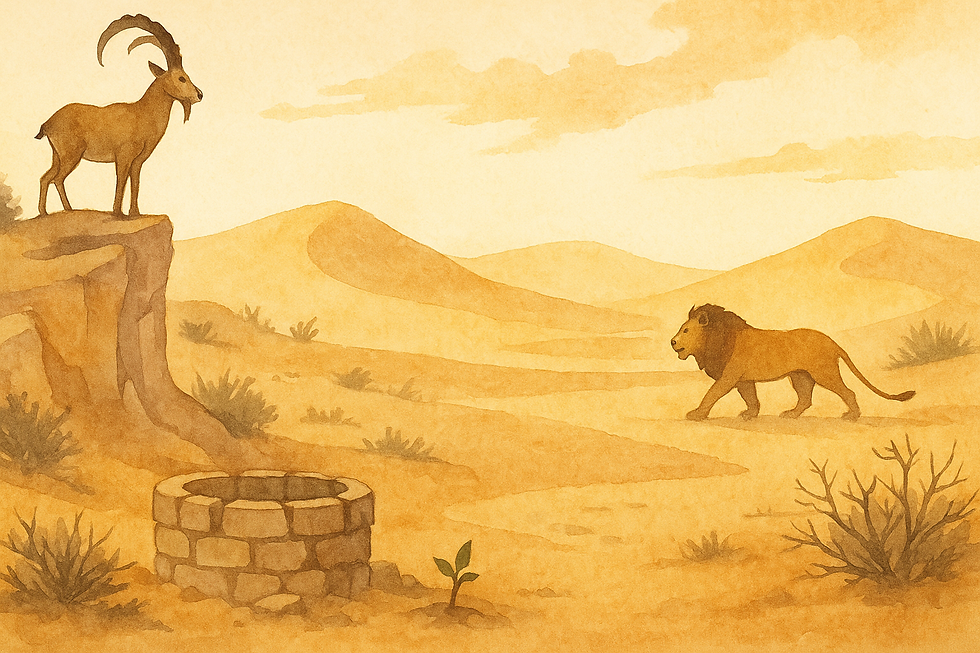🦝 Rix and the Roots of Taughtwell
- Ross Boulton
- Apr 23
- 3 min read
Updated: May 5
Rix the young raccoon dreams of studying under the wise old trees of Taughtwell, where real learning takes root. But getting inside isn’t easy — it takes patience, effort, and a heart hungry for knowledge. A warm and hopeful fable about curiosity, hard work, and the deep roots of true wisdom.
By Ross Boulton (c)2025

In a nook of the Forest, where sun dapples down,
Stood a school in a tree wearing knowledge like a crown.
It was called Taughtwell Tree, and its bark proudly bore
The names of great thinkers from foresty lore.
Its branches held scrolls, its roots hummed with thought,
And critters came climbing to learn what was taught.
But getting inside wasn’t easy, you see—
Only a few got to learn in that tree.
Now Rix the young Raccoon, with eyes big and bright,
Had studied by firefly, deep into night.
He dreamed of the Tree, of the scrolls and the nests,
Of lectures from Owls, and the critical tests.
Just as he reached for the bark’s first rung,
A horn from above on the treetop rung.
From the Baron Badger, fierce, well-fed, and proud,
Came a blustery speech to the gathering crowd:
“Too many chirpers! Too few who dig!
Your classes are leafy, your thinkers too big!
Where are the moles who can tunnel and chew?
And why teach of skies but not digging through dew?”
He stamped and he shouted, he made quite a scene—
Demanded the school swap its staff for a team
Of critters more “balanced,” and lectures more “fair,”
Or he'd stop the sap stream that flowed from the air.
Now Rix, quite alarmed, climbed down with a thud.
His dream felt endangered, his tail streaked with mud.
He scampered to Owl—Professor Grey’s tree—
And asked, “Can the Badger decide what we see?”
The Owl gave a blink, soft feathers a-flick,
Then said, “Change doesn’t come from a shout or a stick.
But voices together? That’s a forest-grown feat.
Let truth be your compass, and fairness your beat.”
So Rix wrote a leaflet—clever and neat—
And pinned it to tree trunks and under critter feet:
“Learning should wander! Let questions run free!
Don’t prune down the branches to shape a new tree!”
Soon chipmunks and turtles and beetles and birds
All shared their own scrolls, their own rhyming words.
They marched to the roots in a marvelous mass,
Chanting, “Wisdom is wide! Let all thinkers pass!”
The Badger, now huffing, had nothing to say—
For the forest had spoken in its own clever way.
And Taughtwell, though rattled, stood firm in the ground,
With a rustle of scroll-leaves, a proud paper sound.
Now Rix? He still studies, with joy and with grace,
And teaches young possums in a cool, shady space.
For a forest that listens, and lets young ones grow,
Is the strongest of trees that the wise ever know.
🌟 Moral:
A forest is brightest where questions take root—
Not where rulers decide which ideas bear fruit.
💡 Did You Know?
In real life, learning isn't just about memorizing facts — it's about growing strong roots of curiosity, patience, and practice! Schools, libraries, and even quiet thinking time help young minds build the skills to climb higher and see farther. Every great idea, invention, or discovery started with a brave little question and the courage to keep asking, “Why?”
✍️ Why I Wrote This
I wrote Taughtwell Tree as both a celebration of learning and a cautionary fable about the creeping pressure to reshape education through fear, force, or political control.
Harvard University—and schools like it—represent centuries of knowledge-building, rigorous inquiry, and the uncomfortable but necessary process of challenging ideas. But lately, these institutions are under siege: not because they’ve failed, but because they’ve dared to ask bold questions and teach beyond slogans. Accusations of “bias” are hurled not to improve education—but to restrict it, intimidate it, or reshape it into something more convenient for power.
This fable was my way of showing what happens when we let loudness override learning.
In the forest, Taughtwell Tree stands not because it is perfect, but because it allows truth to stretch its branches. The badger in this story, like some real-world politicians, doesn’t want truth to grow—he wants it trimmed to fit his tunnel. But the raccoon, Rix, knows that truth requires access, freedom, and shared voices—not just gatekeepers who demand ideological “balance” without understanding what balance means.
I wrote this for students whose dreams feel threatened by politics. For educators pressured to teach less instead of more. And for anyone who believes that knowledge should not be shaped by who shouts the loudest—but by who listens deepest.
Because when we let every young mind climb, the whole forest learns to stand taller.
—Ross Boulton



Comments